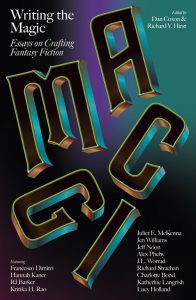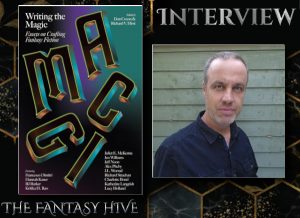Interview with Dan Coxon (WRITING THE MAGIC)
Dan Coxon is an award-winning editor and writer based in London. He has been a finalist for the Shirley Jackson Awards and the British Fantasy Awards (six times), with Writing the Uncanny (co-edited with Richard V. Hirst) winning the British Fantasy Award for Best Non-Fiction 2022. His anthology Being Dad won a Saboteur Award in 2016.
His short stories have appeared in various anthologies and magazines, including Shakespeare Unleashed, Beyond the Veil, Fiends in the Furrows III and Great British Horror 7: Major Arcana. His latest fiction anthology – Isolation – was published by Titan Books in September 2022.
The second book in the Writing series, Writing the Future, was published in September 2023, and the third, Writing the Mystery, is forthcoming in 2024.
He runs a proofreading and editing service, working with both publishers and private clients.
Writing the Magic is published on 18th September by Dead Ink Books
 One of the joys of these books are the spotlight essays. This time round we have some wonderful pieces on Tolkien, Moorcock and Le Guin. Was selecting these authors easy, or was it difficult whittling it down to three authors to represent an entire genre?
One of the joys of these books are the spotlight essays. This time round we have some wonderful pieces on Tolkien, Moorcock and Le Guin. Was selecting these authors easy, or was it difficult whittling it down to three authors to represent an entire genre?Writing the Magic is published on 18th September by Dead Ink Books

